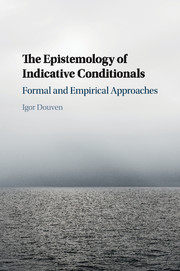Preface and Acknowledgments
Published online by Cambridge University Press: 05 November 2015
Summary
The importance of the role that conditionals play in both everyday and scientific discourse and reasoning is hard to overestimate. Perhaps it is no surprise then that for quite some time, conditionals have been a central area of investigation not only in philosophy, but also in linguistics and psychology, and to some extent in computer science. What is surprising, however, is that despite the considerable expenditure of time and effort of many researchers from those fields, there is still little that one can say about conditionals that is not highly controversial. Even with regard to the most fundamental questions concerning conditionals, there is very little unanimity to be found. Those who have ever proposed a semantics of conditionals can consider themselves fortunate if the proposal won the approval of at least one colleague.
This book focusses on the distinctively epistemological questions that conditionals raise, such as questions concerning their acceptability conditions and probabilities. There is hardly more consensus on these epistemological questions than there is on the semantics of conditionals. And insofar as there is consensus, it is based on questionable assumptions. In this book, I aim to develop at least an outline of the epistemology of conditionals. I do so by relying on the combined use of formal and empirical methods.
While the use of formal and empirical methods in philosophy is viewed much more favorably now than it was when I was a graduate student twenty years ago – formal methods were then associated with logical empiricism, which was generally regarded as a deeply misguided research program, and empirical methods were considered to be perfectly fine, but just not as having a place in philosophy – I have in the course of working on this book met with considerable skepticism from friends and colleagues (some to be named in the following paragraphs) about the methodology of experimental psychology (which basically comprises the empirical methods I have relied on). The main complaint was invariably that this methodology fails to produce robust results: “Ask people a question in one way, and they'll give you one answer; ask the same question in a slightly different way, and you'll get a different answer.”
Probably the only real antidote to such worries is to engage in empirical research with experimental psychologists, who tend to operate in a much more careful and sophisticated manner than my skeptical friends and colleagues seem to suppose.
- Type
- Chapter
- Information
- The Epistemology of Indicative ConditionalsFormal and Empirical Approaches, pp. ix - xiiPublisher: Cambridge University PressPrint publication year: 2015

